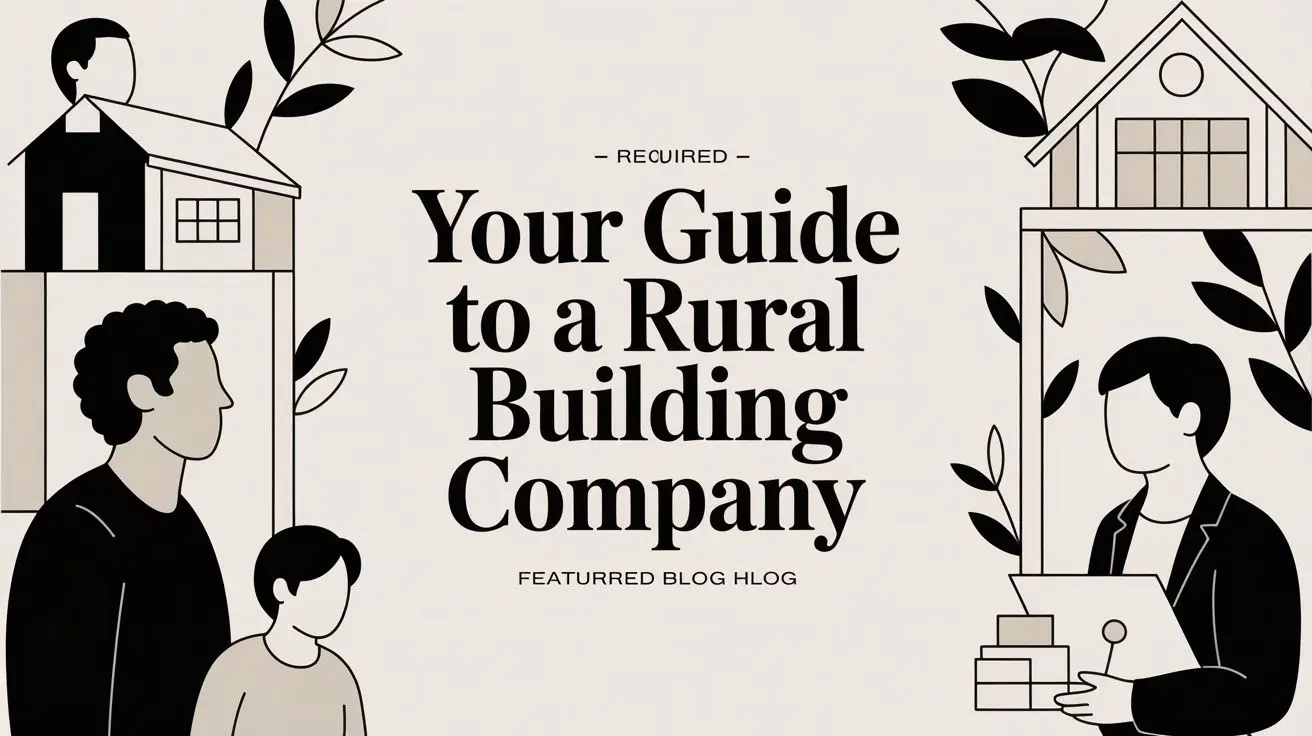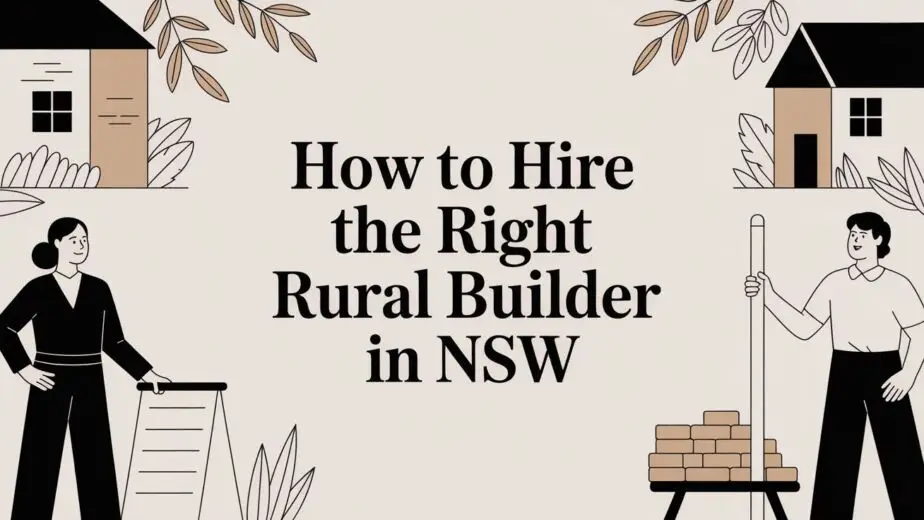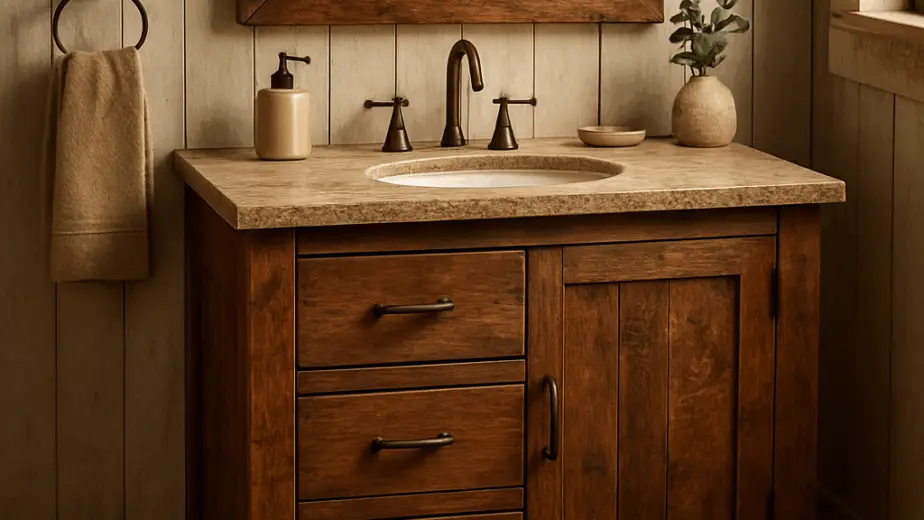A rural building company is exactly what it sounds like: a specialised builder geared up for the unique demands of construction out in the country. Unlike urban builders who have suppliers and utilities at their fingertips, a genuine rural builder is a master of logistics, bringing everything needed—from materials to machinery—directly to your property. This self-sufficiency is what makes or breaks a project when you’re miles from the nearest town.
What Makes a Rural Building Company Different
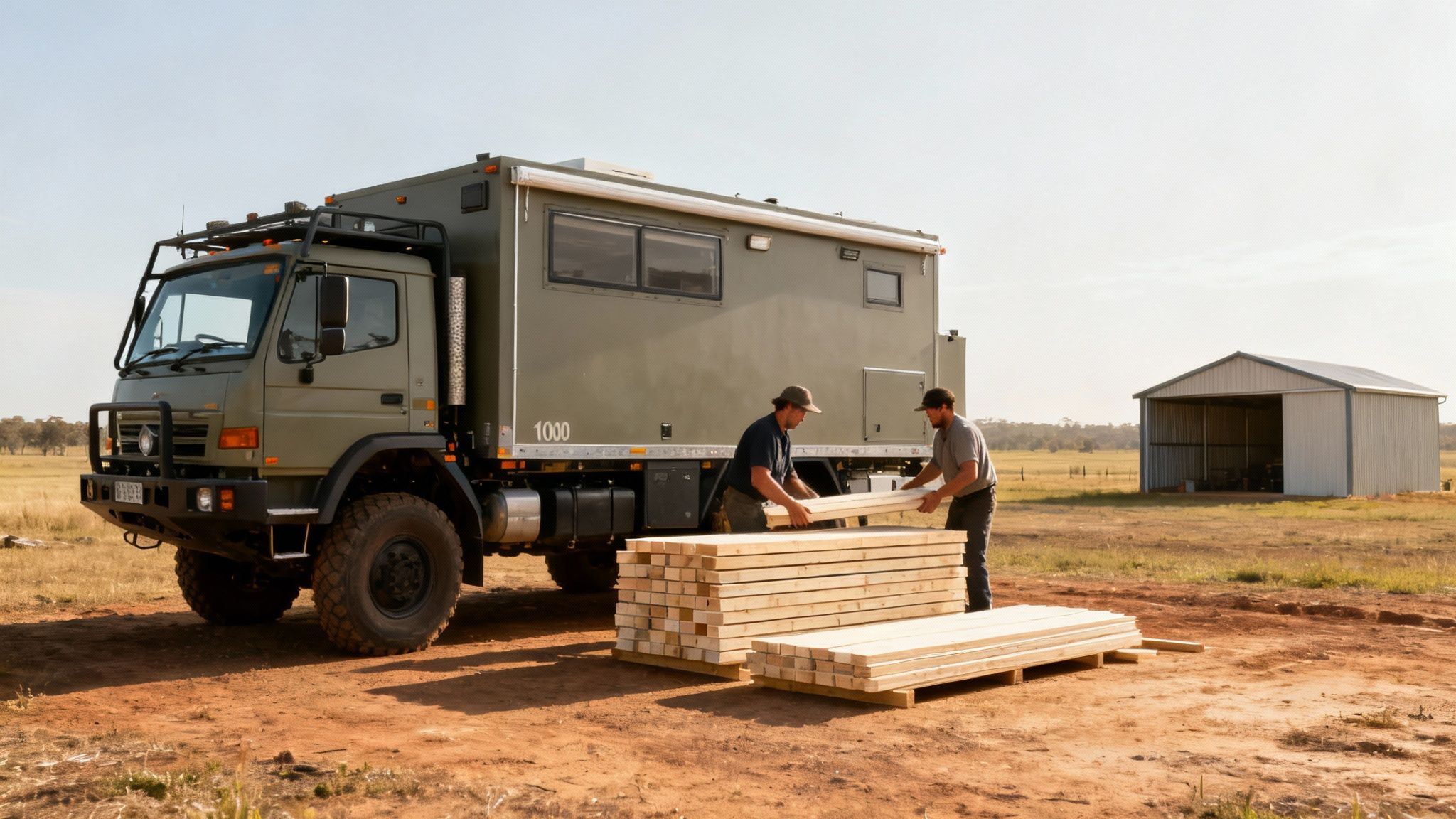
Putting up a structure in the city is a world away from building in the rugged landscapes of rural New South Wales. An urban contractor works in a controlled setting with paved roads, nearby hardware stores, and easy access to power and water. A rural builder, on the other hand, needs to be resourceful and completely independent.
The biggest difference comes down to logistics. A city project can get multiple deliveries of timber, concrete, or steel scheduled without a second thought. On a remote property, that’s not just inefficient—it can be downright impossible. A builder who specialises in rural projects knows how to manage a complex supply chain and mobilise an entire site from scratch.
Overcoming Remote Access Challenges
The heart of our operation is a purpose-built 10 tonne 4×4 truck. It’s far more than just a delivery vehicle; think of it as a mobile workshop and command centre designed to handle the tough terrain of rural NSW. It lets us haul all the labour and materials we need in one go, reaching even the most isolated properties around New South Wales. This allows us to bring in labour and materials where and when it’s needed the most.
With this setup, we can confidently navigate dirt tracks, unsealed roads, and creek crossings that would leave standard construction vehicles stranded. Loading up everything for a specific stage of the project means we sidestep the costly delays that plague builders who aren’t properly equipped for the bush.
This logistical independence is crucial. It ensures your project stays on schedule and within budget, removing the access and supply issues that commonly hinder builders who aren’t equipped for the demands of the bush.
A rural building company also brings a deep understanding of the environment. We know which materials and building techniques will stand up to extreme heat, high winds, and the ever-present threat of pests. This practical knowledge ensures the longevity of your new shed, stables, or home renovation.
On top of that, we’re well-versed in the specific requirements of regional councils. Navigating planning permissions and building codes outside of major cities requires firsthand experience. A dedicated rural builder manages this entire process for you, ensuring full compliance without adding any stress to your plate.
Our expertise covers:
- Logistical Planning: We consolidate materials and labour to minimise travel and maximise on-site efficiency.
- Material Suitability: We choose proven products like Colorbond steel and specially treated timbers that are made for harsh Australian conditions.
- Regulatory Knowledge: We handle all council approvals, making sure every structure meets or exceeds the strict Australian Building Standards for rural zones.
Urban vs Rural Builder Capabilities
It’s easy to assume all builders can handle any job, but rural construction demands a distinct set of skills and equipment. The table below breaks down the key differences.
| Factor | Typical Urban Builder | Specialized Rural Builder |
|---|---|---|
| Logistics | Relies on frequent, small deliveries from local suppliers. | Plans and executes consolidated, large-scale deliveries. |
| Equipment | Standard commercial vehicles (utes, vans). | All-terrain 4×4 trucks and self-sufficient site equipment. |
| Site Access | Works on paved roads with established infrastructure. | Navigates unsealed roads, creek crossings, and rough terrain. |
| Material Knowledge | Familiar with standard residential materials. | Expertise in durable, climate-appropriate materials (e.g., Colorbond, treated timbers). |
| Council Approvals | Experienced with metropolitan council processes. | Deep knowledge of regional council regulations and rural zoning. |
| Self-Sufficiency | Depends on grid power, water, and local services. | Operates off-grid with generators and water transport. |
Ultimately, choosing a builder with proven rural experience means you’re not paying for them to learn on your time. You’re hiring a team that already has the solutions for challenges they know are coming.
Core Building Services for Rural NSW Properties
Putting up a building on rural land is about more than just four walls and a roof. It’s about creating a hardworking asset that adds real, tangible value to your property. A good rural builder knows that every structure has to be designed for the demands of the land and the day-to-day realities of its owner. That means building things that are not only practical but tough enough to handle whatever the Aussie bush throws at them.
For most properties across New South Wales, this comes down to essential structures like custom sheds, solid farm buildings, and secure stables. Every project we tackle starts with a simple conversation about its purpose. Are you trying to protect a half-million-dollar header from the harsh sun? Do you need a safe, efficient space to manage livestock? Or are you finally building that dedicated workshop you’ve always needed? The answers drive every decision, from the initial layout right down to the specific materials we use.
Custom Sheds and Farm Buildings
The humble farm shed has come a long way. Today, it’s a versatile and absolutely vital piece of infrastructure—often the true hub of the entire operation. It’s where gear is stored, maintenance happens, and valuable assets are kept secure. As specialist rural shed builders in NSW, we design structures that serve your exact purpose, ensuring they’ll stand up to the demanding NSW climate for decades to come.
Our entire approach is geared towards creating buildings that are as tough as they are functional. We get there by using high-quality, Australian-made materials known for their sheer resilience.
- Machinery Sheds: Big, open-bay designs are perfect for providing easy access for tractors, harvesters, and other large equipment, protecting your major investments from the elements.
- Hay Sheds: We design these with maximum ventilation in mind to stop moisture from building up and causing spoilage. Keeping your valuable feed dry and safe is the number one priority.
- Workshops: These need to be functional from the ground up. That means reinforced concrete slabs to handle heavy loads, plenty of power points, and smart lighting to create a safe, productive workspace.
- Shearing Sheds: A well-designed shearing shed is all about animal welfare and efficient workflow. We incorporate features that make the whole process smoother and safer for both your stock and your workers.
Durable Stables and Livestock Yards
When you’re dealing with animals, your infrastructure has to put safety, durability, and practicality first. With years of experience as a rural building company, we know how to construct stables and livestock facilities that meet the highest standards of animal welfare while making your daily chores that much easier.
We’ll sit down with you to design a layout that just makes sense for your property. We consider everything from stock flow and access to water to providing decent shelter from the prevailing winds. Every single component is chosen for its strength and longevity, from the kick-proof lining inside the stables to the heavy-duty steel we use for gates and fencing. It’s that attention to detail that ensures your facilities are safe for everyone—two-legged and four-legged alike.
Building for livestock is a specialised skill. It requires a deep understanding of animal behaviour and the immense physical stress these structures are put under. Our focus is always on creating safe, low-stress environments that are genuinely built to last a lifetime.
Materials Engineered for the Australian Bush
The success of any rural construction project really comes down to the materials you choose. Buildings in regional NSW are in a constant battle with intense UV, high winds, wild temperature swings, and pests like termites. Using standard residential-grade materials out here is just asking for trouble.
That’s why we’re absolutely uncompromising when it comes to material selection.
- Colorbond Steel: This iconic Aussie product is our go-to for all roofing and cladding. Its baked-on finish is incredibly resistant to chipping, peeling, and cracking, and it’s been tested in some of the most punishing conditions this continent can dish out.
- Treated Timbers: We always use timber that’s been treated to the correct hazard level (like H4 or H5) for anything that’s going in the ground or will be exposed to the weather. This treatment provides essential protection against termites and fungal decay, safeguarding the structural integrity of your building for the long haul.
This careful selection process means your new structure isn’t just built for today—it’s engineered to serve your property for generations. Critically, we bring all these premium materials directly to your site. Our 10 tonne 4×4 truck allows us to transport supplies to the most remote properties around New South Wales, bringing labour and materials where and when they’re needed most.
How We Bring Your Rural Build to Life
Building on a rural property is a completely different ball game to building in the city. We get that. It’s less about a simple transaction and more about a journey, and our job is to make that journey straightforward and clear from start to finish. From the first chat to handing you the keys, a good rural builder follows a proven process. This is how we make sure nothing gets missed and there are no nasty surprises along the way.
This graphic gives you a quick look at the core of what we do, showing how we handle key projects like sheds, farm buildings, and stables with a focused, efficient approach.
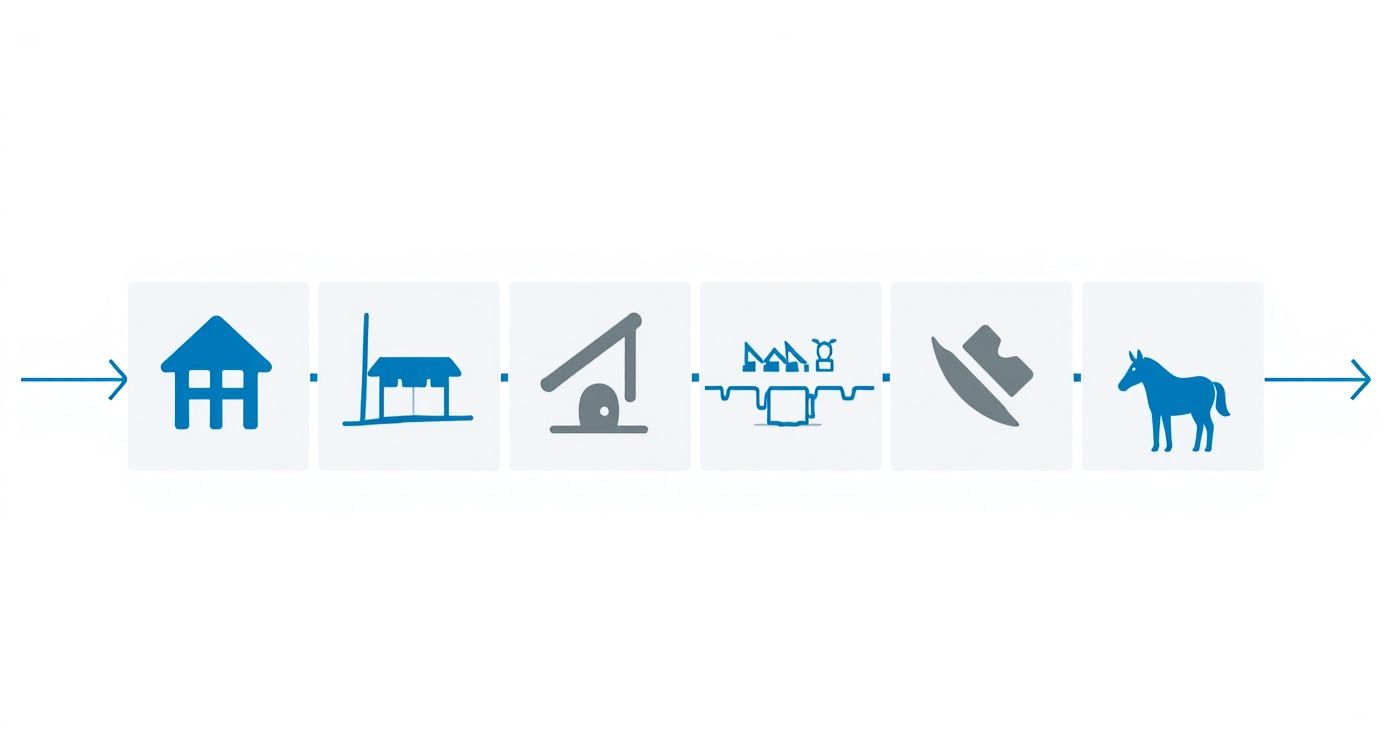
As you can see, each type of build has its own dedicated path, but they’re all connected by the same commitment to quality and getting the job done right.
Step 1: Initial Site Assessment and Planning
Every great building needs a solid foundation, but on a rural block, that work starts long before we dig the first hole. The initial site assessment is probably the most important part of the entire project. This is where we come out to your property, walk the ground, and get a real understanding of the land—looking for things that city-based builders just don’t have to think about.
During this visit, we’re laser-focused on a few key things:
- Land Access and Terrain: How are we going to get trucks, materials, and machinery in? We map out the best routes, taking note of unsealed roads, steep slopes, or creek crossings that need careful planning.
- Soil Conditions and Site Prep: We look at the soil to figure out the right engineering for the footings and see what earthworks are needed. This could be anything from levelling a pad for a shed to sorting out site drainage.
- Environmental Factors: We consider the block’s orientation, the direction of the prevailing winds, and potential risks like bushfire or flooding. This helps us position your new structure for the best possible safety, durability, and practical use.
A thorough site assessment is all about preventing problems before they start. By understanding every challenge and opportunity your land presents from day one, we can create a practical plan that keeps the project on budget and on schedule.
Step 2: Council Approvals and Compliance
Let’s be honest, dealing with council paperwork can be a nightmare. It’s a complex and often frustrating process, so we take it completely off your plate. As your builder, we manage everything from preparing and lodging the Development Application (DA) to securing the final Construction Certificate (CC).
Our experience working with regional councils across New South Wales means we know what they’re looking for. We make sure every detail of your project—from the design and materials to its intended use—is fully compliant with the National Construction Code and any local planning rules. Taking care of this properly from the outset is the key to avoiding administrative headaches and keeping your build moving forward.
Step 3: Logistics and On-Site Construction
Once the approvals are sorted, this is where our planning and preparation really pay off. Getting everything to a remote site requires serious logistical muscle, and the heart of our operation is our 10-tonne 4×4 truck. It’s more than just a vehicle; it’s what allows us to bring our team, supplies, and materials exactly where they need to be, right when they’re needed.
We plan every stage meticulously. This means coordinating the delivery of everything from the structural steel and concrete to the final roofing and cladding. Having our own heavy-duty 4×4 truck gives us the freedom to tackle challenging access on remote properties all over New South Wales, bringing labour and materials where and when it’s needed the most. This self-reliance is what enables us to deliver your project on time, regardless of how far off the beaten path you are.
The construction industry is a massive part of regional Australia’s economy. As of June 2025, there were approximately 452,820 active construction companies in the country, with many of them, like us, focused on servicing rural and regional areas. These businesses are vital, employing skilled locals and building the homes, sheds, and infrastructure that our communities depend on. You can explore more data on Australia’s construction landscape to see just how significant this sector is to our national economy.
Navigating Costs, Timelines, and Insurance Repairs
Building in the country is a different beast to a project in the city, and that’s especially true when it comes to money and schedules. We believe the foundation of any good build is an honest chat about costs, timelines, and the hurdles we might face along the way. As builders who’ve spent years working in rural areas, we make it a point to give you a transparent, no-nonsense breakdown of everything that will shape your budget and finish date.
The final price tag on a rural build comes down to a few key things. Naturally, your choice of materials and the complexity of the design have a big say. But often, the most significant factor is simply getting to the site. A property that’s hard to reach needs more careful planning and sometimes specialised gear, which all has an impact on the bottom line. We spell this all out in our quotes so there are no nasty surprises down the track.
If you’re trying to get a handle on potential costs, our guide on how to estimate house construction costs is a great place to start. It offers some really practical advice for budgeting.
Setting Realistic Timelines
A realistic timeline is everything. It helps you plan and keeps everyone on the same page. A straightforward machinery shed on a flat, ready-to-go block might only take a few weeks. On the other hand, a complex stable block or a major renovation will, of course, need a much longer schedule.
Several things can throw a spanner in the works:
- Council Approvals: This is often the biggest variable right at the start. Waiting for the local council to give the green light can sometimes drag on longer than anyone would like.
- The Weather: You can’t predict the weather in rural NSW. A week of heavy rain can bring all the earthworks and concrete pouring to a grinding halt, just as a heatwave can affect working conditions.
- Material Delays: While we plan everything down to the last nail, supply chain hold-ups for certain materials can still happen. We’re always working to get ahead of these issues to keep things moving.
Our promise to you is to keep the lines of communication wide open. You’ll get regular updates from us, so you’ll always know exactly what’s happening on site.
We Specialise in Insurance Repairs
When a storm, fire, or flood damages your property, it’s an incredibly stressful time. Trying to get your life back in order while navigating an insurance claim is the last thing you need. This is where our experience as rural builders really counts. We’ve managed countless insurance repair jobs from start to finish.
Our whole process is designed to take the weight off your shoulders. We’ll work directly with your insurance company and act as your advocate to make sure the damage is assessed fairly and accurately.
Our number one goal with any insurance repair is to get your property back to how it was before the damage—or even better—using quality materials and proper workmanship. We handle the claim so you can focus on what matters.
We know the Australian construction industry has its challenges. It’s a huge sector, employing over 1 million people, with residential projects making up around 42% of all work. But it’s also faced financial headwinds, with a concerning 35.5% jump in company insolvencies in the first half of 2025. This just highlights how important it is to pick a financially stable, reliable builder, especially for something as critical as insurance work.
The moment you call us in for an insurance job, we take control of the situation:
- Full Damage Assessment: We’ll go over your property with a fine-tooth comb to document every bit of damage, including what might not be immediately obvious.
- Detailed Quoting: We prepare a thorough, itemised quote that gives your insurer all the detail they need.
- Prompt Repairs: As soon as we get the go-ahead, our team gets to work to carry out the repairs efficiently and with minimal disruption to you.
A key part of our ability to respond quickly is our 10-tonne 4×4 truck. This bit of kit is a game-changer, letting us haul all the labour, supplies and materials we need to even the most remote properties across New South Wales. It means we can get started on repairs right away, bringing in help where and when it’s needed the most without access issues causing delays.
How to Choose the Right Rural Builder
Finding the right partner for your rural build is, without a doubt, the most critical decision you’ll make. It’s the one choice that will define the success of your entire project, from the quality of the finished structure to the final figure on the invoice.
When you’re vetting a rural building company, you need to look past a flashy website or a low-ball quote. You’re searching for a team that has proven they can handle the unique pressures and logistical hurdles that come with building in the bush.
https://www.youtube.com/embed/0TyATi81Hfk
Picking the wrong builder can quickly turn your dream project into a nightmare of delays, budget blowouts, and work that just doesn’t stand up to the elements. A company without genuine rural experience simply won’t see the challenges coming, whether it’s navigating council approvals in a regional shire or just getting materials down a muddy track after a downpour.
Verifying Credentials and Experience
First things first: check the fundamentals. Any builder you consider must be fully licensed and insured in New South Wales. This isn’t just a suggestion; it’s a non-negotiable.
Ask to see their contractor licence and proof of current Public Liability Insurance. Also, confirm they hold Home Building Compensation Fund (HBCF) insurance, which is your safety net for residential projects. These documents are essential for protecting your investment.
Once the paperwork checks out, it’s time to dig into their track record. A gallery of glossy photos is nice, but it doesn’t tell the whole story. Ask for the addresses of completed projects and, more importantly, for the contact details of past clients. A builder who is proud of their work will happily provide references.
When you speak to these past clients, get specific:
- Did they stick to the budget?
- Was the project finished on time?
- How did they handle unexpected problems when they cropped up?
- Was communication open and consistent throughout the build?
Hearing directly from people who have been through the process will give you an honest insight into what you can expect. For a deeper look into this process, check out our complete guide on how to choose a builder.
Builder Selection Checklist
To help you stay organised, we’ve put together a checklist of essential questions and checks. Working through this list can help you compare potential builders and make a confident, well-informed decision.
| Verification Point | What to Ask or Check | Why It Matters |
|---|---|---|
| Licensing & Insurance | “Can I see your NSW Contractor Licence and certificates for Public Liability and HBCF insurance?” | This is your baseline protection. It confirms they are legally compliant and that you’re covered if things go wrong. |
| Rural Project Portfolio | Request to see examples of projects similar to yours in a rural setting. Ask for addresses you can drive by. | It proves they have hands-on experience with the specific challenges of rural construction, not just urban or suburban builds. |
| Client References | “Could you provide contact details for 2-3 recent clients whose projects were similar to mine?” | Past performance is the best predictor of future results. Honest feedback from previous customers is invaluable. |
| Logistical Capability | “How do you transport materials and your team to remote sites? Do you own your own heavy vehicles?” | This reveals their self-sufficiency. A builder who controls their own logistics is less likely to face delays due to third-party transport issues. |
| Communication Plan | “Who will be my main point of contact, and how often can I expect updates on the project’s progress?” | Clear, consistent communication prevents misunderstandings and ensures you are always aware of how your project is tracking. |
| Problem-Solving | “Can you give me an example of an unexpected issue on a past rural project and how you resolved it?” | Problems are inevitable in construction. This question tests their experience, creativity, and ability to handle pressure. |
Using a structured approach like this ensures you don’t miss any critical details. It’s about finding a true partner, not just a contractor.
Assessing Logistical Capability and Equipment
Here’s where a genuine rural builder really shows their worth. Managing logistics in a remote setting isn’t just part of the job; it is the job. A builder’s ability to get people, materials, and machinery to your property reliably is everything.
The clearest sign of a well-prepared team is their equipment. You need a builder who is self-sufficient, not one who is constantly juggling a roster of subcontractors for every little task.
A builder’s investment in heavy-duty, all-terrain equipment is a direct reflection of their commitment to rural projects. It shows they understand that getting materials and labour to site is half the battle won.
When you’re talking to a potential builder, ask them point-blank about their gear. What you want to hear is that they own and operate their own heavy vehicles. Our specialised 10-tonne 4×4 truck is the backbone of our operation, allowing us to bring in labour and materials to the most remote properties around New South Wales, where and when it’s needed the most.
This single piece of equipment means we can access properties that are simply out of reach for others, from navigating rough dirt tracks to fording creek crossings. It removes one of the single biggest risks in rural construction: supply chain failure. If a builder can’t guarantee they can get materials to your site, they can’t guarantee your project will finish on time.
Our Service Commitment Across New South Wales
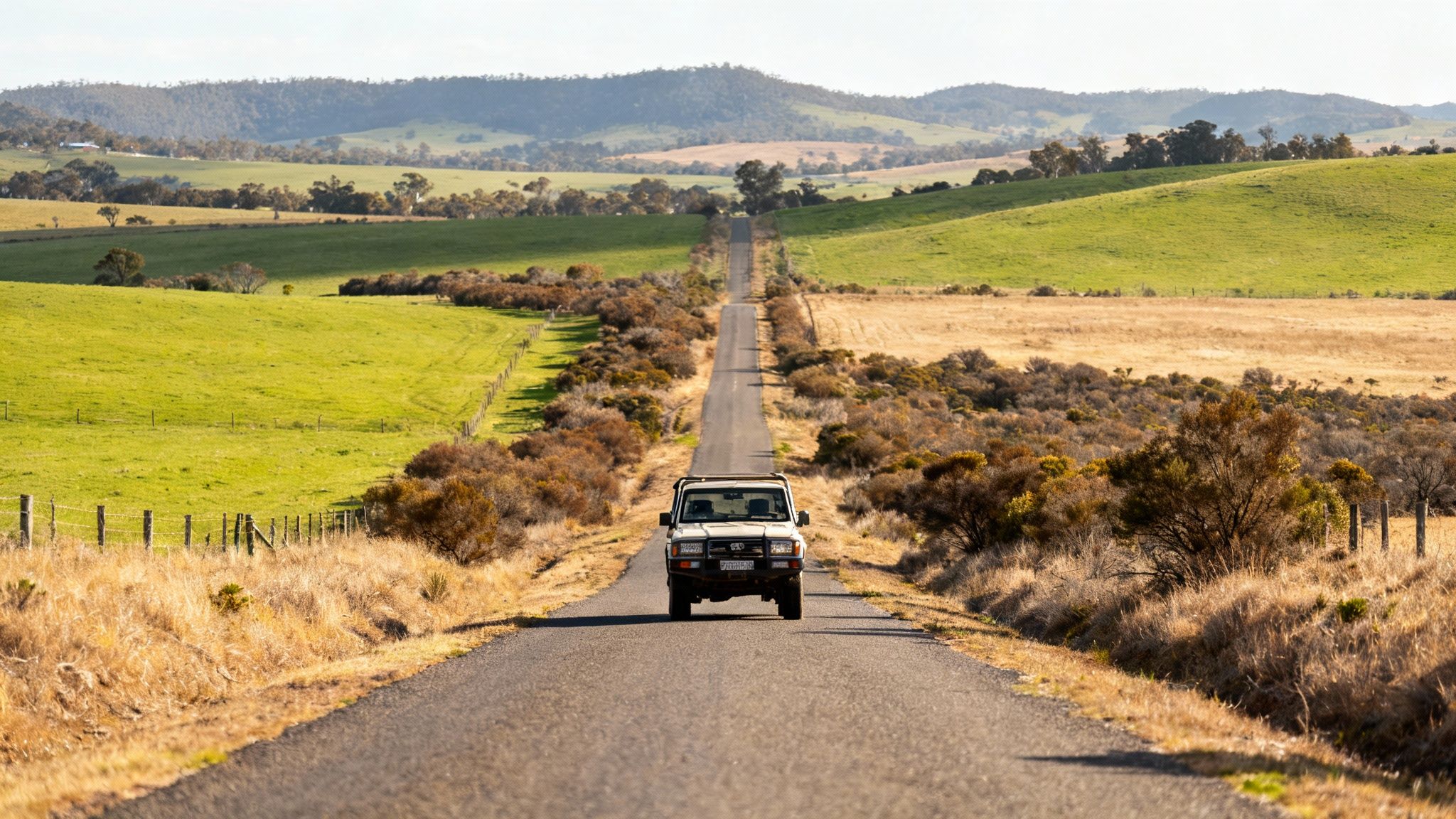
Our goal is simple: to bring top-tier construction services to every corner of rural New South Wales, no matter how far off the beaten track you are. From the Central Tablelands out to the Far West, we’re here for the hardworking communities that are the backbone of this state.
This isn’t just about covering long distances. It’s about understanding the unique and often demanding landscapes that come with the territory.
To make this happen, we’ve invested in specialised equipment designed for the job. The heart of our operation is a purpose-built 10 tonne 4×4 truck, a beast of a vehicle chosen specifically to handle the rugged reality of rural properties. It’s more than just transport; it’s our guarantee that we can get the entire project—materials, supplies, and a skilled crew—directly to you, allowing us to bring in labour and materials where and when it’s needed the most.
Overcoming Logistical Hurdles
Remote properties often throw up logistical challenges that can stop other companies in their tracks. Unsealed roads, creek crossings, and tough terrain can easily disrupt supply chains, leading to frustrating and expensive delays.
Our heavy-duty 4×4 truck lets us tackle these obstacles with confidence. It ensures your remote location is never a barrier to getting quality construction done. This means we can deliver everything from structural steel for a machinery shed near Bourke to treated timbers for stables outside of Armidale, keeping your project moving forward without a hitch.
By managing our own logistics with the right gear, we cut out one of the biggest points of failure in rural projects. This self-sufficiency means a smoother, more predictable building experience for you, helping to keep your project on schedule and on budget.
The demand for skilled builders and new construction in regional Australia is on the rise. In fact, the Australian construction market is set to grow significantly, with one report estimating it could hit AUD 246.67 billion by 2034, partly driven by increasing needs in rural areas.
As a dedicated rural building company, we’re ready to meet this demand head-on. We make sure property owners all over NSW have access to the reliable, high-quality building services they deserve. If you’d like to learn more about this growth, you can explore detailed insights on the residential construction market.
Common Questions About Building in Rural NSW
Starting a building project on a rural property is a big step, and it’s completely normal to have a list of questions. As builders who live and breathe rural construction, we’ve heard them all. Here are some of the most common queries we get from landowners across New South Wales, along with some straight-up answers.
How Do You Get Materials and Crew to My Remote Property?
This is probably the most important question for anyone with a property off the beaten track. Getting materials, supplies, and a skilled team to a remote site is one of the biggest hurdles in rural building, and it’s where our experience really counts.
We’ve invested in our own purpose-built 10-tonne 4×4 truck, which is an absolute game-changer. This beast allows us to load up everything we need—from steel frames to roofing—and bring our crew directly to your property, all in one go. It allows us to bring in labour and materials where and when it’s needed the most, even for the most remote properties around New South Wales. We’re used to dealing with unsealed roads, navigating tricky creek crossings, and accessing sites that would leave standard delivery trucks stranded.
What’s the Very First Step We Take?
Everything starts with a visit to your property. Before we even think about drawing up plans or talking numbers, we need to walk the site with you.
This on-site assessment is where we get a real feel for the land and your vision. We’ll look at:
- Access Routes: How do we get heavy equipment and materials in safely and efficiently?
- The Ground Itself: We’ll check out the soil and lay of the land to plan for the right foundations and any necessary earthworks.
- The Environment: We’ll consider sun exposure, wind direction, and any potential bushfire or flooding risks to make sure your new building is positioned perfectly.
Do You Handle All the Council Paperwork?
Yes, absolutely. Dealing with regional councils can feel like a full-time job in itself. We take that entire headache away from you.
Our team manages everything from preparing and lodging the Development Application (DA) right through to getting the final sign-offs. We’ve worked with councils all over NSW, so we know what they’re looking for, which helps sidestep frustrating delays and keep your project moving.
We handle the red tape so you don’t have to. Our job is to make sure your build is fully compliant with the National Construction Code and local planning laws, giving you total peace of mind.
How Long Will My Project Actually Take?
Every rural build is different, so timelines can vary quite a bit. A straightforward machinery shed on a flat, clear block might only take a few weeks. On the other hand, a custom stable complex with all the trimmings or a major renovation will naturally be a longer process.
The two main things that can stretch out a timeline are waiting on council approvals and, of course, the weather. From the very beginning, we’ll give you a realistic construction schedule and keep you in the loop with regular updates. You’ll always know exactly what’s happening on your property.
Ready to get started on your rural property project? Awesim Building Contractors has the specialised equipment and hands-on experience to deliver, no matter how remote your location.
Let’s Get Your Project Started
If your home, farm building, or rural property needs maintenance, repairs, or renovations, we’re here to help.
Give Awesim Building Contractors a call or request a quote online — we’ll get back to you promptly.
Proudly servicing rural and outback NSW — from the New England region to Gunnedah, Narrabri, Inverell, and beyond.

